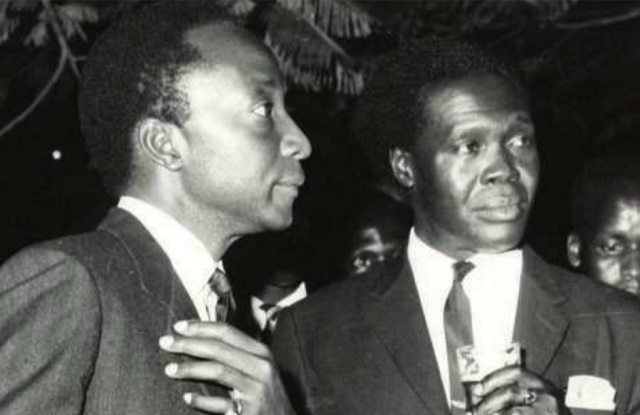
Cheering by NRM as soldiers bundled MPs from parliament shows missed history lessons
COMMENT | Martin M. Lwanga | In all her 54 year history, one fact that remains undeniable is that in Uganda we are low on conflict resolution skills. We also learn little from history.
The latest escapade in parliament- a legislature that was founded in 1921 and had never descended into such a late night bar brawl scene- is another episode in a long and troubled history where we believe might settles all arguments here. As Prof. Abdu Basajjabaka Kawalya Kasozi wrote in his book, `The Social Origins of Violence in Uganda’, resolving conflicts through the gun in post-independence Uganda can be traced to the so-called `1964 Nakalubye incident’- a small domestic scuffle that ended up with security forces unleashing the terror of the gun on a defenseless population with impunity.
The government in power then, craving the army’s support, refused to apprehend and punish the murderous soldiers.
Another incident; the 1966 crisis was a culmination of a long simmering disagreement between the Buganda government and ruling UPC party. Led by Prime Minister Milton Obote, the UPC government became bitterly estranged from the Buganda government led by Kabaka Frederick Mutesa II who was also president of Uganda.
To date, the question is still asked about whether the attack on the king’s palace would have happened if all channels of communication and dialogue had been attempted. It was argued then by the principal players (and even today by some) that only gun could settle the matter. But did it? We know too well the consequence of that decision. Kabaka Mutesa immediately fled into exile and five years later Obote was deposed – through the gun.
In 1972 when Chief Justice Ben Kiwanuka, Uganda’s first Prime minister, was suspected to be in league with guerilla insurgents, then-President Idi Amin could have possibly engaged him. But he was bundled up right from his office, never to be seen again.
Amin was confident the gun had settled the matter. But had it? Later in 1977 when he suspected the clergy also of being involved in subversive activities, the Archbishop Janani Luwum and several cabinet ministers, as had become the pattern, were bungled up at gun point, never to be seen again alive. But two years later- President Amin was gone too – through the gun.
So did Ugandan leaders ever learn that the gun has limitations? Possibly not. In 1979 President Yusuf Lule was removed from power by a confident civilian elite backed by Tanzanian soldiers.
His replacement, President Binaisa, could not last a year, especially once he dared reassign one soldier called Gen Oyite Ojok to a diplomatic post.
The return of Obote to power could have presented a softening of his hard line stance towards the Baganda. However, confident of the army’s backing, Obote showed no appetite to engage in dialogue with Baganda leaders and other opposition elements. As before, four years down the road he was gone- removed by the very guns he had supreme confidence in.
Some would think that this history would have sobered Ugandans to appreciate the limits of the might of the gun. Yet we seem to have a very scanty appreciation of history. The onslaught on the High Court by “Black Mamba commandos” in 2005 to the latest bundling of MPs from the sacred August House, led by special force soldiers, all to the cheers of the majority ruling party, shows how much this nation appreciates history.
At the writing of this article the U.S., together with Western powers, is engaged in an acrimonious exchange with North Korea. It is possible, if the matter were to be left to the two key actors alone, a full scale time nuclear war would be upon us. Fortunately, arising from the lessons of the two world wars, structures of dialogue through the United Nations are now in place. In the civilised world, war happens when all channels of communication have been exhausted.
It is, therefore, the reason why one wonders that in Uganda, almost every time in we hit an impasse, we rush for guns. Dialogue is an age old process where parties with divergent positions sometimes gradually arrive to a common and sustainable understanding. It involves, among others, long talks, often into early morning, weeks and months of engagement. It relies on cool heads able to rise above the heat of emotions, listening to subject experts, opinion, cultural, youth and faith leaders.
Old boy’s networks due to long standing friendships are exploited when leading actors can’t talk anymore. Above all the objective remains to find sustainable solutions than a rush to a quick but temporal victory.
If a society does not value human life as her most precious object then what else matters to it! In 2016 the Kasese conflict could have been resolved through dialogue and hundreds of lives spared. Much as the NRM won the 1981- 6 war; “victory” was followed with over two decades of violence in Eastern and Northern Uganda, leading to tens of thousands of lives being lost, economic ruin and social decay. May we learn to sit down and talk through issues than being so confident that the gun has all answers.
****
Dr Martin M Lwanga is the Dean of the Faculty of Business & Administration, Uganda Christian University, Mukono
 The Independent Uganda: You get the Truth we Pay the Price
The Independent Uganda: You get the Truth we Pay the Price



Well put Martin. It all boils down to one single most virtue- humility.
An excellent review of the past, a meaningful explanation of the current problems and implied profecy pf the fire of Uganda.This piece of writing is medicinal
The Independent Uganda:
Business Partners
Sudan’s Bashir extends truce in 3 conflict zones
Home / comment / COMMENT: Guns against dialogue
COMMENT: Guns against dialogue
The Independent October 9, 2017 comment, In The Magazine 2 Comments 203 Views
Mutesa and Obote. The gun played a role in resolving the conflict of the time
Cheering by NRM as soldiers bundled MPs from parliament shows missed history lessons
COMMENT | Martin M. Lwanga | In all her 54 year history, one fact that remains undeniable is that in Uganda we are low on conflict resolution skills. We also learn little from history.
The latest escapade in parliament- a legislature that was founded in 1921 and had never descended into such a late night bar brawl scene- is another episode in a long and troubled history where we believe might settles all arguments here. As Prof. Abdu Basajjabaka Kawalya Kasozi wrote in his book, `The Social Origins of Violence in Uganda’, resolving conflicts through the gun in post-independence Uganda can be traced to the so-called `1964 Nakalubye incident’- a small domestic scuffle that ended up with security forces unleashing the terror of the gun on a defenseless population with impunity.
The government in power then, craving the army’s support, refused to apprehend and punish the murderous soldiers.
Another incident; the 1966 crisis was a culmination of a long simmering disagreement between the Buganda government and ruling UPC party. Led by Prime Minister Milton Obote, the UPC government became bitterly estranged from the Buganda government led by Kabaka Frederick Mutesa II who was also president of Uganda.
To date, the question is still asked about whether the attack on the king’s palace would have happened if all channels of communication and dialogue had been attempted. It was argued then by the principal players (and even today by some) that only gun could settle the matter. But did it? We know too well the consequence of that decision. Kabaka Mutesa immediately fled into exile and five years later Obote was deposed – through the gun.
In 1972 when Chief Justice Ben Kiwanuka, Uganda’s first Prime minister, was suspected to be in league with guerilla insurgents, then-President Idi Amin could have possibly engaged him. But he was bundled up right from his office, never to be seen again.
Amin was confident the gun had settled the matter. But had it? Later in 1977 when he suspected the clergy also of being involved in subversive activities, the Archbishop Janani Luwum and several cabinet ministers, as had become the pattern, were bungled up at gun point, never to be seen again alive. But two years later- President Amin was gone too – through the gun.
So did Ugandan leaders ever learn that the gun has limitations? Possibly not. In 1979 President Yusuf Lule was removed from power by a confident civilian elite backed by Tanzanian soldiers.
His replacement, President Binaisa, could not last a year, especially once he dared reassign one soldier called Gen Oyite Ojok to a diplomatic post.
The return of Obote to power could have presented a softening of his hard line stance towards the Baganda. However, confident of the army’s backing, Obote showed no appetite to engage in dialogue with Baganda leaders and other opposition elements. As before, four years down the road he was gone- removed by the very guns he had supreme confidence in.
Some would think that this history would have sobered Ugandans to appreciate the limits of the might of the gun. Yet we seem to have a very scanty appreciation of history. The onslaught on the High Court by “Black Mamba commandos” in 2005 to the latest bundling of MPs from the sacred August House, led by special force soldiers, all to the cheers of the majority ruling party, shows how much this nation appreciates history.
At the writing of this article the U.S., together with Western powers, is engaged in an acrimonious exchange with North Korea. It is possible, if the matter were to be left to the two key actors alone, a full scale time nuclear war would be upon us. Fortunately, arising from the lessons of the two world wars, structures of dialogue through the United Nations are now in place. In the civilised world, war happens when all channels of communication have been exhausted.
It is, therefore, the reason why one wonders that in Uganda, almost every time in we hit an impasse, we rush for guns. Dialogue is an age old process where parties with divergent positions sometimes gradually arrive to a common and sustainable understanding. It involves, among others, long talks, often into early morning, weeks and months of engagement. It relies on cool heads able to rise above the heat of emotions, listening to subject experts, opinion, cultural, youth and faith leaders.
Old boy’s networks due to long standing friendships are exploited when leading actors can’t talk anymore. Above all the objective remains to find sustainable solutions than a rush to a quick but temporal victory.
If a society does not value human life as her most precious object then what else matters to it! In 2016 the Kasese conflict could have been resolved through dialogue and hundreds of lives spared. Much as the NRM won the 1981- 6 war; “victory” was followed with over two decades of violence in Eastern and Northern Uganda, leading to tens of thousands of lives being lost, economic ruin and social decay. May we learn to sit down and talk through issues than being so confident that the gun has all answers.
****
Dr Martin M Lwanga is the Dean of the Faculty of Business & Administration, Uganda Christian University, Mukono